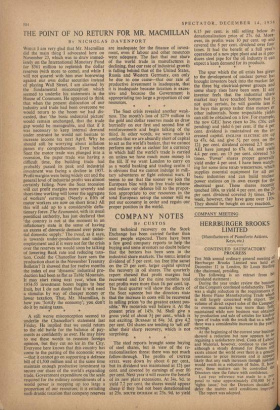THE POINT OF NO RETURN FOR MR. MACMILLAN
BY NICHOLAS DAVENPORT WHILE I am very glad that Mr. Macmillan did the main thing I advocated here on November 23, which was to draw immed- iately on the International Monetary Fund for $561 million to replenish the dollar reserves (with more to come), and while I will not quarrel with him over borrowing against our own dollar securities instead of playing Wall Street, I am alarmed by the fundamental misconception which seemed to underlie his statements in the House of Commons. He appeared to think that when the present dislocation of our industry and trade had been overcome we would return to the boom we had dis- carded, that 'the basic industrial picture' would remain unchanged, that the trade gap would be manageable, and that if it was necessary to keep internal demand under restraint he would not hesitate to increase income tax next April. Why he should still be worrying about inflation passes my comprehension. Even before Suez the motor trade was plunged into a recession, the paper trade was having a difficult time, the building trade had probably passed its peak and industrial investment was facing a decline in 1957. Profit margins were being widely cut and the general level of industrial profits was almost certainly falling. Now the Suez recession will cut profit margins more severely and short-time working will lower the aggregate of workers' earnings. (Nearly a fifth of motor workers are now on short time.) All this will add up to a considerable defla- tionary force. The Economist, with its usual pontifical authority, has just declared that 'the country is not at the moment in an inflationary state in the sense of having an excess of domestic demand over poten- tial domestic supply.' The trend, as it says, is towards under-production and under- employment and if it were not for the crisis over the reserves we would soon be talking of lowering Bank rate and reducing taxa- tion. Could the Chancellor have seen the production chart in the November Treasury Bulletin? It showed that for twelve months the index of our 'dynamic' industrial pro- duction had been as flat as Table Mountain. It may start rising next year, when the 1954-55 investment boom begins to bear fruit, but I do not doubt that it will need a stimulus by way of cheaper money or lower taxation. That, Mr. Macmillan, is how you 'fortify the economy'; you don't do it by raising taxes.
A still worse misconception seemed to underlie the Chancellor's statement last Friday. He implied that we could return to the old battle for the balance of pay- ments as confidently as ever. He may have to use these words to reassure foreign opinion, but they cut no ice in the City. Everyone here knows that this country has come to the parting of the economic ways —that it cannot go on supporting a defence bill of i1,500 million and at the same time maintain enough productive investment to secure our share of the world's expanding trade. Government expenditure on the scale required for the military commitments of a world power is mopping up too large a proportion of our resources; it is entailing such drastic taxation that company reserves are inadequate for the finance of invest- ment, even if labour and other resources were adequate. The fact that our share of the world trade in manufactures is declining, that our rate of industrial growth is falling behind that of the United States, Russia and Western Germany, can only be due to one cause—that our rate of productive investment is inadequate, that it is inadequate because taxation is exces- sive and because the Government is appropriating too large a proportion of our resources, The Suez crisis revealed another weak- ness. The month's loss of $279 million in the gold and dollar reserves made us draw hurriedly on our first and second line of reinforcements and begin talking of the third. In other words, we were made to confess that we are absurdly short of capital to act as the world's banker, that we cannot perform our role as cashier for a currency in which half the world's trade is carried on unless we have much more money in the till. If we want London to carry on as a world banking and trading centre it is obvious that we cannot indulge in mili- tary adventures or fight colonial wars. It seems to me that the sooner we join the European bloc with its free trade scheme and reduce our defence bill to the propor- tion appropriate to our resources in the total European set-up the sooner will we put our economy in order and regain our proper position in the world.










































 Previous page
Previous page